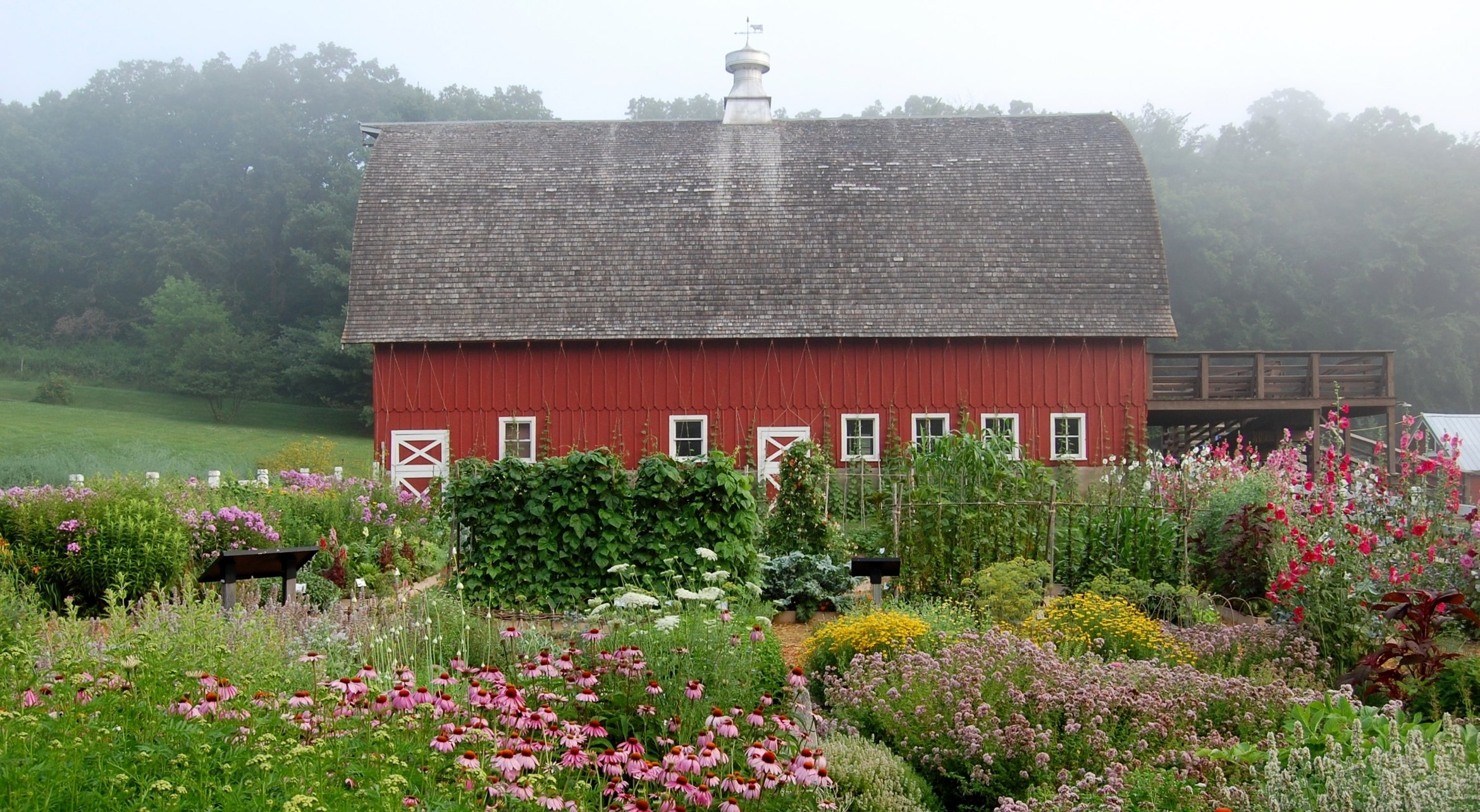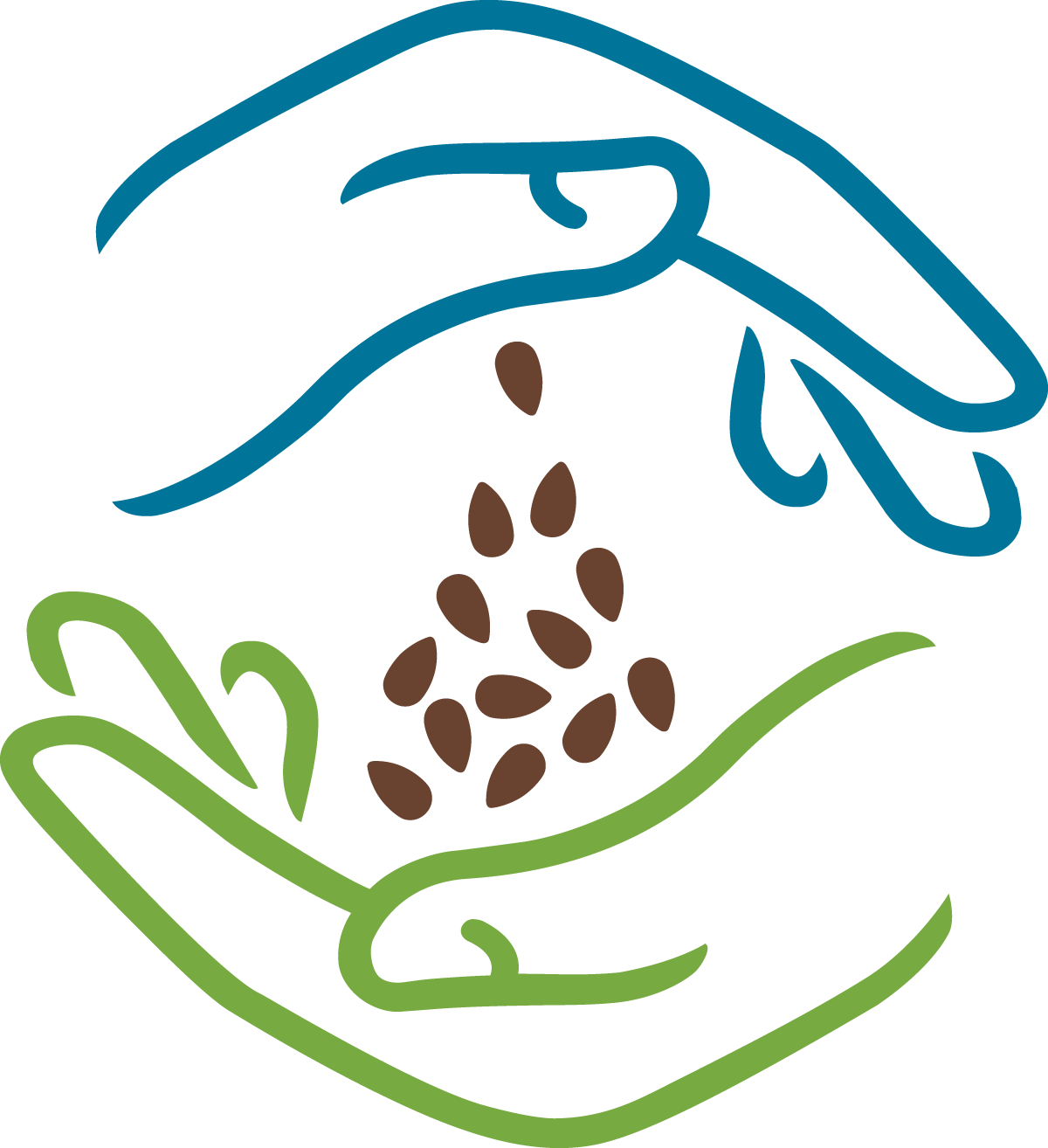Melissa DeSa: Seed Champion of the Sunshine State
/Seed Savers Exchange Member Melissa DeSa leads the charge to educate Florida residents about the importance of saving and sharing seeds.
Melissa DeSa (left) shares a moment with DIanE oTT Whealy, Cofounder of Seed Savers EXchange, at Heritage Farm in Decorah, Iowa.
Melissa DeSa grew up amid the cool temperatures, majestic moose, and breathtaking mountains and woodlands of Western Canada. It’s the Sunshine State’s relentless heat, fearsome gators, and swamps and rural farmlands, however, that ultimately captured her heart.
“When I relocated to Florida, I immediately fell in love with the heat, the humidity, and the wildness,” she says of moving (way) south upon securing a job as a wildlife biologist with the University of Florida in 2004. “I also discovered I’m most happy with my hands buried in the earth and my brow beaded with sweat, listening to insects buzz around me.”
That’s a good thing since dirt-encrusted hands, sweat-stained shirts, and buzzing bees and flies all come with the territory at Forage, the nonprofit she cofounded with her close friend Anna Prizzia in 2012 to educate and inspire people to support and sustain the local food movement. “It’s still a small organization, so I find myself multitasking all the time,” says DeSa of her somewhat unpredictable workload, which involves everything from fundraising and doing “not-so-fun administrative stuff” to driving supply trailers loaded with manure and mulch and sharing her expertise on gardening and seed saving.
Though DeSa now swings a hoe like a pro, it wasn’t all that long ago that she was “just throwing stuff in the ground and learning by trial and error” while experimenting with different heirloom varieties at her Gainesville home. She proved a quick study, however, and today her extensive and thriving home garden showcases some of her favorite vegetables and flowers, including cockscomb celosia, cosmos, Mexican sunflowers, zinnia, and calendula.
DeSa traces her appreciation for gardening to her childhood—she fondly recalls watching her parents tend their garden crops, including six-foot-tall tomato plants—but her passion for seed saving was sparked much more recently, and quite unexpectedly. “About seven years ago, a community member suggested we start a seed library, and for some reason still unknown to me, I jumped on it immediately and helped make it happen,” she recalls. “From there, I started to learn more about the plight of seed diversity and how to save seeds. At that point, there was no turning back—I couldn’t stop myself from saving seeds from everything and started investigating flowers and fruits to figure out where the seeds were.”
It made sense, then, that when DeSa helped launch Forage five years ago, she prioritized a seed library in the plans. Begun “pretty small, grassroots, with a handful of local gardeners who liked the idea of having a seed library,” the Southern Heritage Seed Collective resonated with the community and has since grown in both mission and membership. (It now boasts more than 2,000 supporters.) “We started by bulk purchasing good seeds for our region that we could share with gardeners,” she says. “But then it turned into a mission to educate about the art and practice of seed saving once we learned about the importance of protecting regional varieties.”
"This pumpkin is a true Southern heirloom," says Melissa DeSa of the 'Seminole' variety, found in abundance at Forage, the nonprofit she cofounded In Gainesville, Florida.
Since putting down roots in Florida, DeSa has developed an affinity for many of those regional varieties, especially the 'Seminole' pumpkin. The round, sweet, and lightly ribbed squash was cultivated for thousands of years by the Native Americans, eaten in abundance by early settlers in the region, and nearly lost many years ago when, according to local lore, soldiers burned the pumpkins when they saw them to starve out the Native Americans so that they could capture them more easily. “This pumpkin is a true Southern heirloom, and my friends will tell you how in love I am with it,” says DeSa. “It doesn’t need much care, grows with abandon out of compost piles, has an incredible shelf life, and tastes really good—honestly, there’s nothing not to love so I continue to steward it each year because I can’t imagine life without it.”
DeSa harbors just as much enthusiasm for growing flowers—“every garden needs them, and lots of them” she says—and educating today’s youth about the importance of locally grown food and rare and heirloom seeds. “If our kids don’t know or care about seeds, gardens, farmers, the environment, water, and healthy eating, then all the work we all do trying to save our little part of the world is wasted time,” she says of the impetus behind the Forage Farms Youth Gardening program, which partners with local farm to school efforts to get kids outside, digging, planting, weeding, and learning. “Our work saving seeds goes hand-in-hand with youth education because our youth are the future of our community, making choices about food, farmers, seeds, and healthy lifestyles.”
“Seeds are a metaphor for so much in life—though often small in size, their ineffable power of transformation and promise offer hope and happiness for the future.”
—Melissa DeSa, Seed Savers Exchange member
Since its founding, says DeSa, Forage has worked hard to spread the word about why seed saving and growing diverse crops are so important to the future of the planet. “Previously, no one in our gardening and agricultural community was talking about seeds,” she says. “Now it’s part of our collective conscience—gardeners think more about their seeds, where they come from, how to save them, and whom to ask when they have questions.”
Fortunately, DeSa herself knows exactly where to turn when she has questions about seed saving. Long captivated by Seed Savers Exchange’s colorful seed catalogs, she first visited Heritage Farm a few years ago to attend its annual three-day seed school. “Heritage Farm immediately felt like home, and I knew I had to return because three days was simply not enough,” she says. “I have since returned two more times and am always so happy to learn, grow, and evolve, just like a seed.” Seed Savers Exchange co-founder Diane Ott Whealy, for one, is always glad to see her: “Melissa is one of the best volunteers I have ever had in my garden at Heritage Farm,” she says. “She always knows exactly what needs to be done and exactly how to do it.”
Perhaps that’s because she has spent much of her life immersed in nature and much of the last decade learning all she can about gardening and seed saving. Or perhaps it’s because she feels such a deep connection to the seeds so many take for granted. “Seeds are really a metaphor for so much in life—though often small in size, their ineffable power of transformation and promise offer hope and happiness for the future,” says DeSa. “When I spend time gathering and cleaning seeds, I feel at home, at peace, like I have found my life’s work. And that’s a great feeling to have.”
Join Melissa Desa as a member of Seed Savers Exchange! Your support ensures that all of us, today and tomorrow, can behold the wonder of the unique vegetables, flowers, herbs, and fruit trees under our care.















